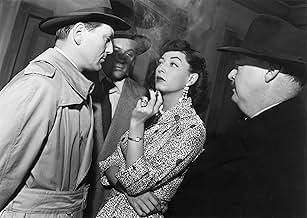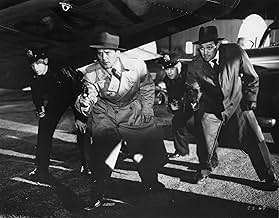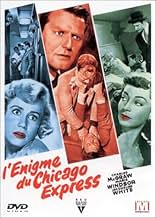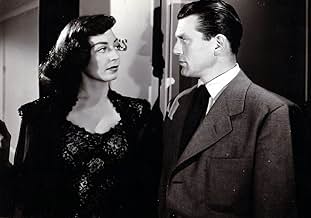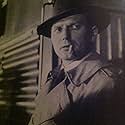VALUTAZIONE IMDb
7,6/10
9453
LA TUA VALUTAZIONE
Una donna che intende testimoniare contro un'organizzazione criminale deve essere protetta dagli assassini durante il viaggio in treno da Chicago a Los Angeles.Una donna che intende testimoniare contro un'organizzazione criminale deve essere protetta dagli assassini durante il viaggio in treno da Chicago a Los Angeles.Una donna che intende testimoniare contro un'organizzazione criminale deve essere protetta dagli assassini durante il viaggio in treno da Chicago a Los Angeles.
- Regia
- Sceneggiatura
- Star
- Candidato a 1 Oscar
- 1 candidatura in totale
Peter Brocco
- Vincent Yost
- (non citato nei titoli originali)
Ivan Browning
- Waiter
- (non citato nei titoli originali)
George Chandler
- Accomplice Running Newsstand
- (non citato nei titoli originali)
James Conaty
- Tenant in Apartment House Hallway
- (non citato nei titoli originali)
Don Dillaway
- Reporter
- (non citato nei titoli originali)
Franklyn Farnum
- Train Passenger
- (non citato nei titoli originali)
Bess Flowers
- Wagon Restaurant Diner
- (non citato nei titoli originali)
Don Haggerty
- Det. Wilson
- (non citato nei titoli originali)
Recensioni in evidenza
The Narrow Margin is excellent. It's too bad more of our new directors have forgotten how to make a great film with a minimal budget, using instead inventive camera angles, good characters and dialog, and some surprises along the way. I really loved Marie Windsor as the mobster's wife who's going to LA to sing to the Grand Jury. She's one of the toughest broads I've ever seen! Charles McGraw does his standard tough cop role and turns in a performance that sets the standard by which all others are judged.
This is the original, and beats the heck out of the re-make.....
This is the original, and beats the heck out of the re-make.....
After finally waking herself up, a mobsters wife decides to testify against him and his organisation. As the trial draws closer she is constantly under threat of being murdered before she can spill the beans. Tough detective Walter Brown and his partner Gus Forbes are assigned to escort her safely across country via a train from Chicago to Los Angeles, but nobody can be trusted, and the threat of death is around everyone on board this speeding train.
Yes it may well be a "B" movie, but as "B" movies go this has to rank as one of the finest exponents of that particular arc. With the film taking place almost entirely on board the train, the tension sapping and claustrophobic feel is perfectly executed by director Richard Fleischer. The plot twists and turns and throws up genuine moments of surprise that thrill instead of hinder, whilst the ending doesn't cop out by pandering to the normal requisite of witness protection thrillers.
Charles McGraw is great as Brown, putting the hard into hard boiled and Jacqueline White is very precious as Ann Sinclair. Truth is, is that all the cast work well within the confines of this tightly produced picture. It was a surprise hit for RKO, where made on a small budget of under a quarter of a million dollars, it turned out to be a very profitable "B" production for the company. It wowed audiences back in the 50s and it's testament to the film's worth that today, here in the modern age, it's still being sought out and praised by movie lovers of all ages. 8/10
Yes it may well be a "B" movie, but as "B" movies go this has to rank as one of the finest exponents of that particular arc. With the film taking place almost entirely on board the train, the tension sapping and claustrophobic feel is perfectly executed by director Richard Fleischer. The plot twists and turns and throws up genuine moments of surprise that thrill instead of hinder, whilst the ending doesn't cop out by pandering to the normal requisite of witness protection thrillers.
Charles McGraw is great as Brown, putting the hard into hard boiled and Jacqueline White is very precious as Ann Sinclair. Truth is, is that all the cast work well within the confines of this tightly produced picture. It was a surprise hit for RKO, where made on a small budget of under a quarter of a million dollars, it turned out to be a very profitable "B" production for the company. It wowed audiences back in the 50s and it's testament to the film's worth that today, here in the modern age, it's still being sought out and praised by movie lovers of all ages. 8/10
I'm a huge Charles McGraw fan. Every film he had a large part in, he excels and makes the film better.
Having seen this film 4 or 5 times, my respect for it has grown over the years.
The cinematography isn't perfect - the film probably could have benefited by staying dark and grainy as it seems to be in the early, night scenes.
The taut train scenes seem too bright, but there's nothing wrong with it, simply my preference. A darker train would have made for a more sinister film. Even so, there's plenty of excitement.
The crackling dialogue between Charles McGraw and Marie Windsor is consistently sharp. Seriously, you will have a hard time finding anything more bitter than those two. I'm not sure any other male-female could have made the dialogue (which in a 1950's way is almost corny) come off so terse, as they continuously bark at each other. Someone needs to count the number of times McGraw tells Windsor to "Shut up!".
The film has some exciting twists and turns; you'll enjoy each one.
Great story, solid performances all the way around. This is a FUN movie.
Having seen this film 4 or 5 times, my respect for it has grown over the years.
The cinematography isn't perfect - the film probably could have benefited by staying dark and grainy as it seems to be in the early, night scenes.
The taut train scenes seem too bright, but there's nothing wrong with it, simply my preference. A darker train would have made for a more sinister film. Even so, there's plenty of excitement.
The crackling dialogue between Charles McGraw and Marie Windsor is consistently sharp. Seriously, you will have a hard time finding anything more bitter than those two. I'm not sure any other male-female could have made the dialogue (which in a 1950's way is almost corny) come off so terse, as they continuously bark at each other. Someone needs to count the number of times McGraw tells Windsor to "Shut up!".
The film has some exciting twists and turns; you'll enjoy each one.
Great story, solid performances all the way around. This is a FUN movie.
Charles McGraw plays edgy cop Walter Brown. His job is to protect a dead racketeer's wife, Mrs Neil (Marie Windsor) from the mob. She's a key witness in a grand jury probe, and also has a payoff list linking gang members to the LAPD. Most of the film's action takes place on board the train taking Brown and Neil to Los Angeles, where she will testify.In Mrs. Neil, played to perfection by Windsor, the queen of B movies, the tough talking, wise-cracking Brown meets his match. On the way to meet her, he glibly tells his partner, Gus Forbes that "She's the sixty cent special. Cheap. Flashy. Sticky poison under the gravy." When he and Forbes, both from Los Angeles, first meet her, she says, "How nice. How Los Angeles." Then looking Brown up and down, she snarls, "Sunburn wear off on the way?" My favorite wisecrack occurs after Brown has finally had enough of her wise remarks and lashes out, "You make me sick to my stomach." Her retaliation is a gem: "Well, use your own sink." Unlike the banter between Nick and Noira Charles of The Thin Man series, there's nothing the least sophisticated about the way Brown and Neil talk each other. Director Richard Fleischer uses inventive camera work, the sounds of the train rather than a music score, and the train's claustrophobic atomsphere to create and sustain tension. An RKO picture, The Narrow Margin is an unpretentious, taut low-budget thriller, a minor classic far superior to the 1990 Gene Hackman-Anne Archer remake.
Trains have it all over ships and planes when it comes to creating a microcosm. On an airplane, everybody's crammed together; nobody can sneak on or leave (except by parachute or defenestration). An ocean liner has its private staterooms and public spaces, but, again, is an island, entire onto itself. But trains stop regularly to take on and disgorge passengers, and they run along their fixed and earthbound course, with windows looking out on rivers and highways, at big cities at high noon and small towns in the dead of night. And so they've always been the preferred vehicle for suspense, with countless thrillers using the rails as their setting. One of the tautest and most toothsome, in its modest, low-budget way, is Richard Fleischer's The Narrow Margin.
It opens in Chicago, where a pair of Los Angeles police detectives are to escort the widow (Marie Windsor) of a recently slain gang leader back to the coast to testify before a grand jury. She's a hard case (`a 60-cent special...poison under the gravy'), and guarding her is a dangerous job. Sure enough, one of the cops takes a fatal bullet in the stairway of her low-rent apartment house (she shows scant sympathy). Windsor's finally smuggled aboard the train, in a Pullman car's locked compartment adjoining that of her custodian Charles McGraw. Almost certainly, one or more mobsters followed her. It's up to McGraw to smoke them out before they kill Windsor, who knows too much. But he slowly learns that some vital information has been deliberately kept from him....
Fleischer makes inventive use of the jostling in the cramped passageways and of the all but vanished rituals of club cars and dining cars. He packs the train with seasoned character actors, notable among them Jacqueline White, Paul (`Nobody loves a fat man') Maxie, and Don Beddoe. The closely worked script, by Earl Fenton (based on a novel by Martin Goldsmith, who also penned the original material for Detour), doesn't stint on gaudy patter for them to spout (it's a moveable feast of salty epigrams).
Best of all, The Narrow Margin offers the addictive Marie Windsor her meatiest role, showcasing her tough-gal talents. Rolling her huge and extraordinary eyes, she aims her exhaled smoke like a stream of deadly gas and hard-boils her lines into hand grenades (to McGraw: `This train's headed straight for the cemetery. But there's another train coming along a gravy train. Let's get on it.'). It's one of Hollywood's more perplexing secrets why Windsor toiled exclusively, with the possible exception of her Sherry Peatty in Stanley Kubrick's The Killing, in the B-movie ghetto. But she helped make that ghetto the liveliest part of Tinsel Town.
It opens in Chicago, where a pair of Los Angeles police detectives are to escort the widow (Marie Windsor) of a recently slain gang leader back to the coast to testify before a grand jury. She's a hard case (`a 60-cent special...poison under the gravy'), and guarding her is a dangerous job. Sure enough, one of the cops takes a fatal bullet in the stairway of her low-rent apartment house (she shows scant sympathy). Windsor's finally smuggled aboard the train, in a Pullman car's locked compartment adjoining that of her custodian Charles McGraw. Almost certainly, one or more mobsters followed her. It's up to McGraw to smoke them out before they kill Windsor, who knows too much. But he slowly learns that some vital information has been deliberately kept from him....
Fleischer makes inventive use of the jostling in the cramped passageways and of the all but vanished rituals of club cars and dining cars. He packs the train with seasoned character actors, notable among them Jacqueline White, Paul (`Nobody loves a fat man') Maxie, and Don Beddoe. The closely worked script, by Earl Fenton (based on a novel by Martin Goldsmith, who also penned the original material for Detour), doesn't stint on gaudy patter for them to spout (it's a moveable feast of salty epigrams).
Best of all, The Narrow Margin offers the addictive Marie Windsor her meatiest role, showcasing her tough-gal talents. Rolling her huge and extraordinary eyes, she aims her exhaled smoke like a stream of deadly gas and hard-boils her lines into hand grenades (to McGraw: `This train's headed straight for the cemetery. But there's another train coming along a gravy train. Let's get on it.'). It's one of Hollywood's more perplexing secrets why Windsor toiled exclusively, with the possible exception of her Sherry Peatty in Stanley Kubrick's The Killing, in the B-movie ghetto. But she helped make that ghetto the liveliest part of Tinsel Town.
Lo sapevi?
- QuizIn preference to removing various walls from the sets, director Richard Fleischer decided to make extensive use of a handheld camera that could be brought into rooms; this was one of the first films to do so. To save money, the train sets were rigidly fixed to the floor and the camera was moved to simulate the train rocking.
- BlooperThere are palm trees at the Denver train station.
- Citazioni
Walter Brown: Pardon me, I'd like to get through.
Jennings: Sorry, this train wasn't designed for my tonnage, heh. Nobody loves a fat man except his grocer and his tailor!
- Versioni alternativeAlso available in a computer colorized version.
- ConnessioniFeatured in Hollywood the Golden Years: The RKO Story: Howard's Way (1987)
I più visti
Accedi per valutare e creare un elenco di titoli salvati per ottenere consigli personalizzati
- How long is The Narrow Margin?Powered by Alexa
Dettagli
Botteghino
- Budget
- 188.000 USD (previsto)
- Tempo di esecuzione
- 1h 11min(71 min)
- Colore
- Proporzioni
- 1.37 : 1
Contribuisci a questa pagina
Suggerisci una modifica o aggiungi i contenuti mancanti


